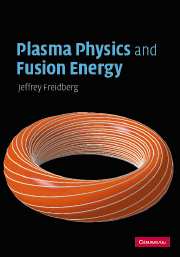Book contents
- Frontmatter
- Contents
- Preface
- Acknowledgements
- Units
- Part I Fusion power
- Part II The plasma physics of fusion energy
- 6 Overview of magnetic fusion
- 7 Definition of a fusion plasma
- 8 Single-particle motion in a plasma – guiding center theory
- 9 Single-particle motion – Coulomb collisions
- 10 A self-consistent two-fluid model
- 11 MHD – macroscopic equilibrium
- 12 MHD – macroscopic stability
- 13 Magnetic fusion concepts
- 14 Transport
- 15 Heating and current drive
- 16 The future of fusion research
- Appendix A Analytical derivation of 〈ς v〉
- Appendix B Radiation from an accelerating charge
- Appendix C Derivation of Boozer coordinates
- Appendix D Poynting's theorem
- Index
- References
9 - Single-particle motion – Coulomb collisions
Published online by Cambridge University Press: 14 May 2010
- Frontmatter
- Contents
- Preface
- Acknowledgements
- Units
- Part I Fusion power
- Part II The plasma physics of fusion energy
- 6 Overview of magnetic fusion
- 7 Definition of a fusion plasma
- 8 Single-particle motion in a plasma – guiding center theory
- 9 Single-particle motion – Coulomb collisions
- 10 A self-consistent two-fluid model
- 11 MHD – macroscopic equilibrium
- 12 MHD – macroscopic stability
- 13 Magnetic fusion concepts
- 14 Transport
- 15 Heating and current drive
- 16 The future of fusion research
- Appendix A Analytical derivation of 〈ς v〉
- Appendix B Radiation from an accelerating charge
- Appendix C Derivation of Boozer coordinates
- Appendix D Poynting's theorem
- Index
- References
Summary
Introduction
Coulomb collisions are the next main topic in the study of single particle motion. The theory of Coulomb collisions is a basic building block in the understanding of transport processes in a fusion plasma. This understanding is important since the transport of energy and particles directly impacts the power balance in a fusion reactor. An overview of the topics covered in Chapter 9 and their relation to fusion energy is presented below.
An analysis of Coulomb collisions shows that there are two qualitatively different types of transport: velocity space transport and physical space transport. In velocity space transport, Coulomb collisions lead to a transfer of momentum and energy between particles in v⊥, v∥ space that tends to drive any initial distribution function towards a local Maxwellian. Generally there are no accompanying direct losses of energy or particles from the plasma (the mirror machine being an exception). In physical space transport, Coulomb collisions lead to a diffusion of energy and particles out of the plasma. These are direct losses affecting the plasma power balance, with energy transport almost always the more serious of the two.
A comparison of the two types of transport shows that velocity space transport almost always occurs on a much faster time scale. Typically, the transport time in velocity space is approximately (rL/a)2 shorter than for physical space. This chapter focuses on velocity space transport. The important issue of physical space transport is addressed in Chapter 12 after self-consistent plasma models have been developed.
- Type
- Chapter
- Information
- Plasma Physics and Fusion Energy , pp. 183 - 222Publisher: Cambridge University PressPrint publication year: 2007



